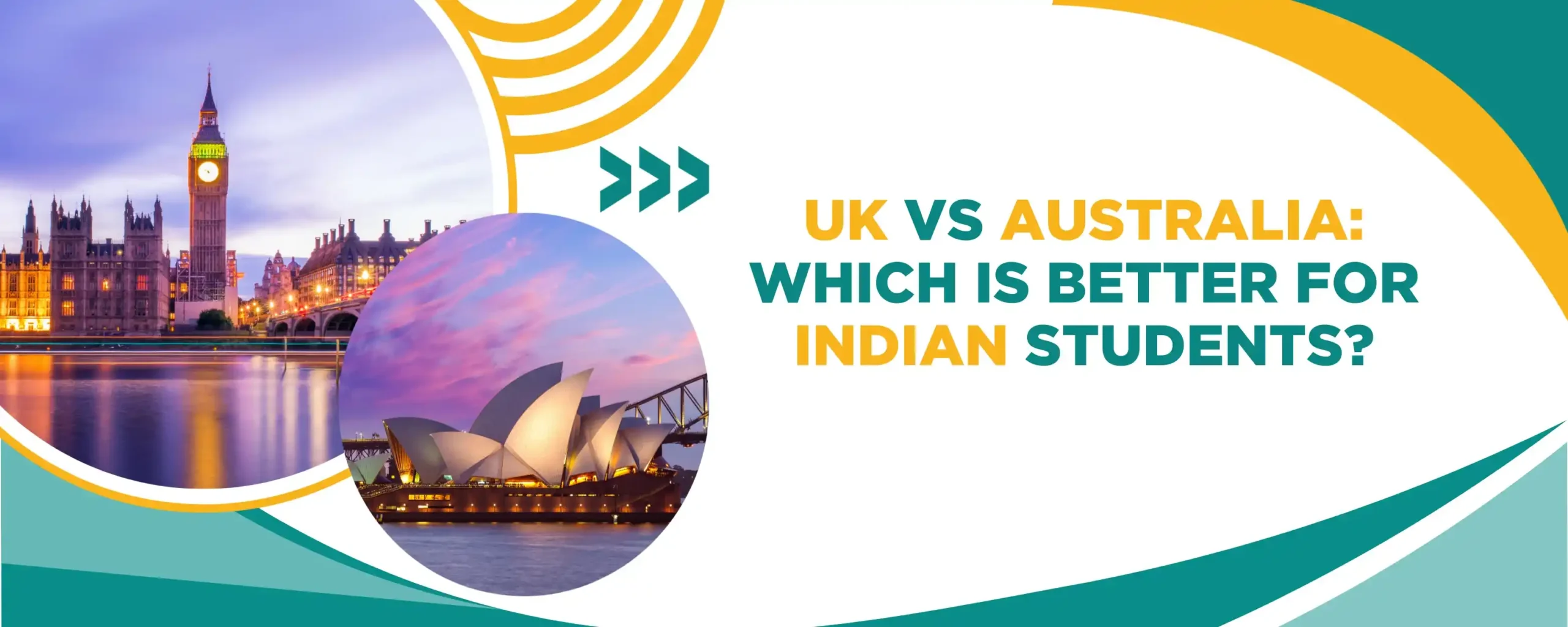Planning to study in the United Kingdom? Great choice. The UK’s world-renowned universities, diverse academic environment, and promising career opportunities attract thousands of students from around the world. However, the high cost of studying and living in the UK for Indian students is a big worry.
With London being one of the most expensive cities, one must properly budget their finances. Though studying in the UK is good value for money, investing a considerable sum in your education does require careful consideration. So, here is a comprehensive breakdown of the cost of studying and living in the UK and practical strategies so that you don’t have to put much load on your pockets.
Cost of Studying in the UK for Indian Students
The cost of studying in UK universities range between GBP 10,000 and GBP 38,000, depending on whether it’s a public or private university, what degree level you’re studying at and where the university is located. As an international student, you’ll also need to pay several other fees and charges while living in the UK i.e. accommodation, transport, food etc. This makes it really important to research and choose universities and locations wisely.
Average Annual cost for Indian Students in the UK:
| Particulars | Description | |
| Cost of Studying in the UK for Indian Students | Tuition Fees by Degree level | UG: INR 9L to INR 39L (GBP 9K to GBP 38K) |
| PG: INR 13L to INR 31L (GBP 11K to GBP 30K) | ||
| Tuition Fees by University Type | Public Universities: INR 8L to 19L (GBP 8K to 18K) | |
| Private Universities: INR 5L to 38L (GBP 5K to 35k) | ||
| Cost of Living in the UK for Indian Students | Accomodation Food & Groceries Transportation Household Bills Entertainment Miscellaneous Expenses | Inside London: INR 1.34L (GBP 1.3K) |
Tuition Costs at Public Universities in the UK
Public universities in the UK offer high-quality education at relatively lower tuition fees compared to private institutions. For Indian students, these universities provide an affordable way to earn a globally recognized degree. Additionally, many public universities offer scholarships and financial aid, reducing the overall cost of education.
Below, you will find detailed information on the cost of studying in the top public colleges
| University | Average Tuition Fees (£) | Tuition Fees (INR) |
| University of Oxford | £9,250 to £38,000 | ₹9,26,000 to ₹38,00,000 |
| University of Cambridge | £20,000 to £40,000 | ₹19 lakhs to ₹38 lakhs |
| Imperial College London | £32,000 to £45,000 | ₹30 lakhs to ₹43 lakhs |
| University College London | £17,000 to £35,000 | ₹16 lakhs to ₹33 lakhs |
| University of Manchester | £20,000 to £30,000 | ₹19 lakhs to ₹28 lakhs |
| University of Birmingham | £20,000 | INR 21,00,000 |
| University of Glasgow | £18,500 | INR 19,40,000 |
If you’re on a tight budget, consider these cost-effective public universities that offer high-quality education at reasonable tuition fees:
- University of Chester – Affordable tuition fees and a low cost of living.
- Teesside University – Competitive fees and strong industry connections.
- University of Sunderland – Lower tuition costs and excellent student support.
- University of West London – Offers numerous scholarships for international students.
- Leeds Beckett University – Provides affordable courses with high employability rates.
Tuition Costs at Private Universities in the UK
Private universities in the UK tend to charge higher tuition fees than public institutions, but they often provide more personalized programs, smaller class sizes, and flexible learning options. These universities are known for specialized courses, strong industry links, and tailored career support, making them attractive to students seeking a premium education experience.
Below, you will find detailed information on the cost of studying in the top private colleges
| University | Average Tuition Fees (£) | Tuition Fees (INR) | Popular Courses |
| University of Buckingham | £12,000 to £24,000 | INR 11,91,964 to INR 23,83,929 | Known for courses in Medicine, computing, economics, business, and accounting and finance. |
| Regent’s University London | £17,000 to £22,500 | INR 16,91,512 to INR 22,33,760 | Popular courses – Business, arts, humanities, and social sciences |
| BPP University | £6,000 to £9,250 | INR 5,97,295 to INR 9,18,316 | Wide range of programs in business, law, finance, and health-related disciplines |
| University of Law | £9,250 to £15,000 | INR 9,18,316 to INR 14,93,694 | Specific programs in Law, legal practice, and business. |
| St. Mary’s University | £9,250 to £15,000 | INR 9,18,316 to INR 14,93,694 | UG and PG courses in arts, humanities, sciences, and social sciences |
| Royal Conservatoire of Scotland | £21,207 to £33,987 | INR 21,17,743 to INR 33,88,013 | Performing arts disciplines such as music, drama, dance, and production. |
Before choosing a private university, you should carefully assess your career goals, budget, and scholarship opportunities. While private institutions offer specialized courses, strong industry links, and tailored career support, they come with higher tuition fees. To make making the right decision, compare the long-term benefits against the costs.
Cost of Studying a Bachelor’s Degree for Indian Students in the UK
International undergraduate tuition fees vary from £11,400 – £38,000. Typically undergraduate degrees last 3 years. Tuition fees vary based on the university and course. Besides tuition, students must budget for books, study materials, lab fees, and other academic expenses. Additional costs include accommodation, food, transport, and personal expenses, which differ depending on the city. Below is a table outlining the average annual tuition fees for popular undergraduate courses in the UK.
| Course | Average Tuition Fee (GBP) | Average Tuition Fee (INR) |
| Engineering | £18,000 – £30,000 | ₹20,00,000 – ₹30,00,000 |
| Business & Management | £14,000 – £37,000 | ₹15,00,000 – ₹40,00,000 |
| Medicine | £32,000 – £52,000 | ₹23,00,000 – ₹60,00,000 |
| Law | £11,000 – £27,000 | ₹11,00,000 – ₹28,00,000 |
| Computer Science | £15,000 – £28,000 | ₹15,00,000 – ₹28,00,000 |
| Arts & Humanities | £12,000 – £20,000 | ₹12,00,000 – ₹20,00,000 |
| Social Sciences | £20,000 – £36,000 | ₹20,00,000 – ₹37,00,000 |
Cost of Studying a Master’s Degree for Indian Students in the UK
International postgraduate tuition fees vary from £9,000 – £35,000. Many postgraduate degree courses in the UK can be completed in one year of full-time study. A one-year master’s programme is financially beneficial as it reduces tuition and living expenses compared to other countries. Tuition fees vary depending on the university, program, and location. In addition to tuition, students should budget for course materials, research costs, and living expenses. Below is a table outlining the average annual tuition fees for popular postgraduate courses in the UK.
| Course | Average Tuition Fee (GBP) | Average Tuition Fee (INR) |
| Engineering | £20,000 – £35,000 | ₹20,00,000 – ₹35,00,000 |
| Business & Management | £18,000 – £30,000 | ₹18,00,000 – ₹30,00,000 |
| Medicine | £32,000 – £55,000 | ₹32,00,000 – ₹55,00,000 |
| Law | £17,000 – £25,000 | ₹17,00,000 – ₹25,00,000 |
| Computer Science | £16,000 – £28,000 | ₹16,00,000 – ₹28,00,000 |
| Arts & Humanities | £14,000 – £22,000 | ₹14,00,000 – ₹22,00,000 |
| Social Sciences | £9,000 – £30,000 | ₹9,00,000 – ₹30,00,000 |
City-wise Living Costs in the UK for Indian Students
Are you wondering how much money is required to study in the UK? The cost of living depends on various factors, including your lifestyle, location, and priorities. London, being a major city, is costlier than other regions.
Your living expenses will be a huge part of the total if you are from India or a different country. Are you wondering how much money is required to study in the UK? The amount of money required to study in the UK is not defined, and the actual cost may vary depending on your location and lifestyle.
Estimated monthly living costs are mentioned below.
- Inside London: £1,300-£1,400 per month (INR 1.34L)
- Outside London: £900-£1300 per month (INR 1L)
London is the most expensive, while cities like Manchester, Birmingham, and Glasgow offer more affordable options for students. The table below provides an estimate of monthly living expenses, including accommodation, food, transport, and other necessities for Indian students in major UK cities.
| City | Accommodation | Food | Transport | Miscellaneous | Total Estimated Cost (GBP) | Total Estimated Cost (INR) |
| London | £900 – £1,500 | £250 – £350 | £150 – £200 | £200 – £300 | £1,500 – £2,350 | ₹1,50,000 – ₹2,35,000 |
| Manchester | £500 – £900 | £200 – £300 | £100 – £150 | £150 – £250 | £950 – £1,600 | ₹95,000 – ₹1,60,000 |
| Edinburgh | £600 – £1,000 | £200 – £300 | £120 – £180 | £150 – £250 | £1,070 – £1,730 | ₹1,07,000 – ₹1,73,000 |
| Birmingham | £450 – £850 | £180 – £280 | £90 – £140 | £140 – £220 | £860 – £1,490 | ₹86,000 – ₹1,49,000 |
| Glasgow | £400 – £800 | £180 – £280 | £80 – £130 | £130 – £200 | £790 – £1,410 | ₹79,000 – ₹1,41,000 |
Affordable Study Options for Indian Students in the UK
Managing tuition fees and living expenses in the UK can seem challenging, but there are several ways for Indian students to reduce costs. Here are some cost-saving strategies to help you manage your costs while studying in the UK:
- Plan Your Monthly Budget: Set a realistic budget for rent, groceries, transportation, and utilities. Use apps to track your spending and stick to this budget as much as possible to avoid overspending.
- Utilise Student Discounts: Use your student ID or sign up for services like TOTUM or an NUS student card to take advantage of travel, food, and entertainment discounts.
- Cook at Home: Eating out in the UK is expensive. Save money by cooking meals instead of eating out. Plan your meals, shop for groceries wisely, and explore local markets for affordable ingredients.
- Choose Affordable Accommodation: To reduce rental expenses, consider university housing or shared apartments. Look for options close to your campus to save on transport.
- Work Part-Time: Use your 20-hour-per-week work allowance during term time to earn and offset living expenses while adhering to tax and visa regulations.
- Opt for Public Universities: Tuition fees at public universities are generally lower than private institutions, making them a budget-friendly choice.
- Choose Affordable Cities: Studying in cities like Glasgow, Birmingham, and Manchester can significantly cut living expenses compared to London.
- Apply for Scholarships & Grants: Many UK universities and organizations offer scholarships for international students. Research and apply early to maximize your chances.
Conclusion
Studying in the UK is a dream for many Indian students, and while the costs may seem high, there are plenty of ways to ease the financial burden as discussed above. Smart planning and the right strategies can make it an affordable reality without taking a lot of stress. Need expert guidance on your study abroad journey? La Forêt Education offers personalized coaching for IELTS, TOEFL, and PTE, ensuring you achieve the required scores for top UK universities. Get started today and turn your UK study dreams into reality!
Frequently Asked Questions
1. What is the cost of living for Indian students in the UK?
Ans: The cost of living for Indian students in the UK varies depending on the city, lifestyle, and accommodation choices. On average, students in London may need £1,300–£1,500 (₹1,37,000–₹1,58,000) per month, while in other cities like Manchester or Birmingham, it can range from £900–£1,200 (₹95,000–₹1,26,000). This includes rent, food, transport, and other daily expenses.
2. Is studying in the UK expensive?
Ans: Yes, studying in the UK can be expensive, but the costs depend on factors like university choice, location, and lifestyle. Tuition fees for undergraduate courses range from £12,000–£38,000 (₹12.6–₹40 lakh) per year, while postgraduate programs cost £14,000–£45,000 (₹14.7–₹47 lakh) per year. However, with scholarships, part-time work, and careful budgeting, students can manage expenses effectively.
3. Can I study in the UK in 20 lacs?
Ans: Yes, studying in the UK within ₹20 lakh (approx. £19,000–£20,000) is possible, but it requires careful financial planning. Opting for affordable public universities, securing scholarships, choosing budget-friendly cities, and working part-time can help reduce expenses. Some universities offer postgraduate programs under this budget, while undergraduate courses may require additional funding.





